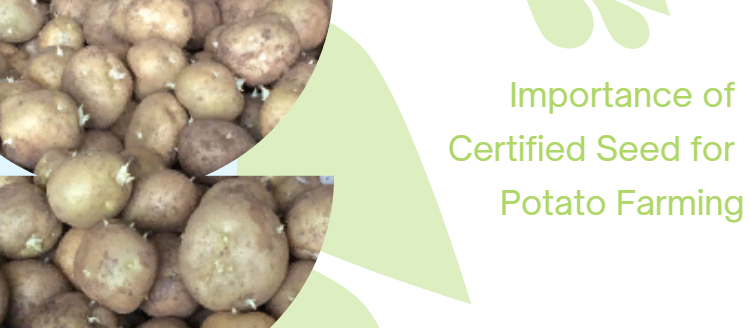#CertifiedSeed #PotatoFarming #CropPerformance #Profitability #DiseaseTolerance #SeedCertification #YieldLoss #PotatoViruses #PCN
Discover the significance of using certified potato seed in agriculture. Learn about the guidelines, varietal purity, and disease tolerance requirements set by national seed certification regulations. Uncertified seed can lead to infections and yield loss, making it crucial to prioritize certified seed for optimal crop performance and profitability.
Certified potato seed plays a crucial role in ensuring successful potato farming by adhering to strict guidelines for varietal purity and disease tolerance. National seed certification rules and regulations establish the standards for certified seed, providing farmers with a reliable source for high-quality planting material.
Using uncertified seed or alternatives like one-off seed, culls, oversize tubers, or seconds can pose significant risks to potato crops. One of the primary concerns is the potential infection of the Potato Leaf Roll Virus (PLRV). This viral infection can result in substantial losses in both yield and quality, leading to significant financial setbacks for farmers.
Numerous studies have highlighted the detrimental impact of viruses on potato crops. For instance, research conducted by Hamm and Hann in 1999 demonstrated that potato plants grown from PLRV-infected seed yielded at least 60% less total yield and 88% less marketable yield (tubers >85 g) compared to plants grown from healthy seed. Additionally, PLRV-infected seed resulted in plants with fewer and smaller tubers.
In another study, the yield of Red Pontiac seed stocks infested with potato virus X (PVX) was reduced by 21.85% compared to PVX-free stocks, as reported by Hoyman in 1964. Similarly, a Russet Burbank crop infected with seedborne potato virus Y (PVY) experienced an average yield reduction of 63.5% according to Whitworth et al. in 2006.
Certification of seed serves as an assurance that diseases are not present at levels that would negatively impact crop yield or marketability. In the case of certain diseases such as bacterial wilt and potato cyst nematode (PCN), complete exclusion is necessary to prevent disease spread and yield loss. The National Standard for Certification of Seed Potatoes (AUSVEG, August 2007) mandates routine testing of all fields used for certified seed crops for PCN. This testing involves collecting aggregated soil samples across a ten by ten-meter grid per two hectares, ensuring the field’s “PCN-free” status is maintained.
Choosing certified seed is a proactive step to minimize the risk of diseases and maximize crop performance. By adhering to national seed certification regulations, farmers can ensure that their potato crops are planted with high-quality seeds that have undergone rigorous testing and meet the necessary purity and disease tolerance standards.
By opting for certified seed, farmers can significantly reduce the likelihood of yield losses, maintain the marketability of their produce, and protect their overall profitability. Investing in certified seed provides a solid foundation for a successful potato farming operation.
| Table 2-3: Block trial measurement of the combined effects of PVX and PVS on yield and tuber production of Netted Gem potato in British Columbia, 1969 (Wright, 1970). | ||||
| Yield (t/ha) | No. Tubers/100 m | |||
| Virus Content | Marketable | Total | Marketable | Total |
| Virus Free | 56.8 | 59.5 | 20,830 | 23,160 |
| PVX and PVS | 44.0 | 46.4 | 18,500 | 20,970 |
| Actual difference1 | 12.8 | 13.1 | 2,330 | 2,190 |
| % difference | 29.8 | 28.1 | 12.5 | 9.6 |
Leaving seed quality to chance can have severe consequences for potato farmers. To optimize crop performance and profitability, it is imperative to prioritize the use of certified potato seed. Adhering to guidelines for varietal purity and disease tolerance, as established by national seed certification rules and regulations, ensures that the resulting crop is less susceptible to infections and yield loss. By making informed choices about seed quality, physiological age, and disease certifications, farmers can maximize their crop’s potential and secure long-term success.
Sourse: Australian Potato Growers







